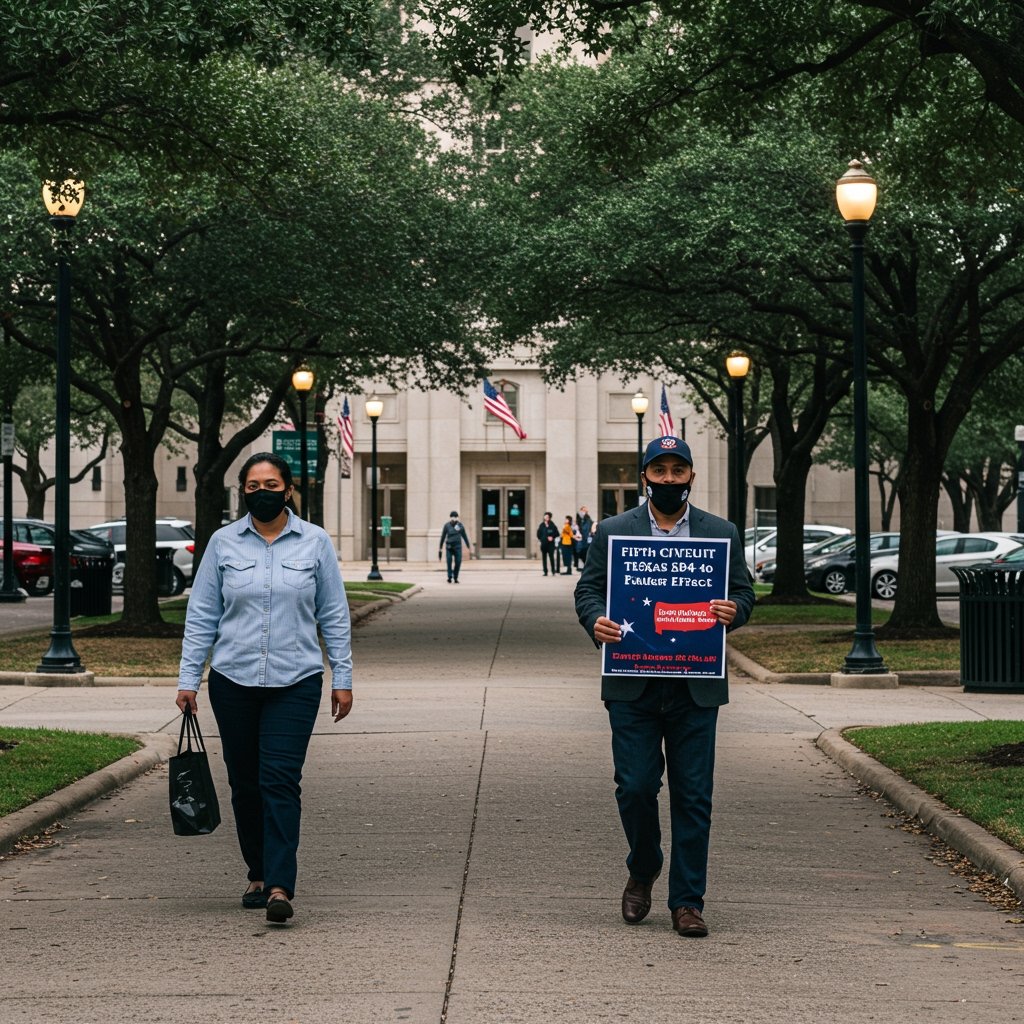Fifth Circuit Grants Temporary Stay, Allowing Texas’s SB4 to Take Effect Pending Further Review
NEW ORLEANS, LA – In a significant legal development concerning immigration enforcement authority, the U.S. Court of Appeals for the Fifth Circuit has granted Texas’s request for a temporary stay of a lower court’s preliminary injunction that had blocked the implementation of Senate Bill 4 (SB4). The ruling, issued late on Sunday, February 23, 2025, temporarily clears the path for the controversial state law to take effect across Texas. SB4, enacted by the Texas Legislature and signed into law, seeks to criminalize illegal entry into the state from Mexico, a power traditionally held by the federal government.
The Fifth Circuit’s decision effectively pauses the order issued just days prior by U.S. District Judge David Ezra of the Western District of Texas. Judge Ezra had granted a preliminary injunction on Friday, February 21, 2025, finding that SB4 likely encroached upon the federal government’s exclusive authority over immigration matters under the U.S. Constitution’s Supremacy Clause. That injunction had prevented Texas state officials from enforcing the provisions of SB4 while legal challenges against the law proceeded through the courts.
Background on Texas Senate Bill 4
Texas SB4, signed into law in December 2023, creates new state crimes related to border crossings. Specifically, it makes it a state crime for a foreign national to enter or attempt to enter Texas from a foreign nation unless they enter through a lawful port of entry. The law grants state judges the authority to order migrants to return to Mexico. Failure to comply with a state judge’s order to leave the U.S. could result in felony charges. Proponents of the law, including Texas Governor Greg Abbott, argue that the state is compelled to take action due to what they describe as a failure by the federal government to secure the international border. They maintain that SB4 is a necessary measure to address the high volume of illegal crossings and the perceived strains on state resources and public safety.
The Legal Challenge and Lower Court Ruling
The constitutionality of SB4 was swiftly challenged by multiple parties, including the Biden administration through the U.S. Department of Justice, and a coalition of civil rights groups, including the American Civil Liberties Union (ACLU) and the Texas Civil Rights Project. These challengers argued that SB4 is unconstitutional because it infringes upon the federal government’s sole authority to regulate immigration and manage international borders. They contended that the Constitution and federal statutes, such as the Immigration and Nationality Act, preempt state attempts to create their own immigration enforcement schemes.
Judge Ezra, in his detailed 114-page order granting the preliminary injunction on February 21, largely sided with the plaintiffs’ arguments. He concluded that SB4 directly conflicts with federal law and the U.S. Constitution. His ruling emphasized the long-standing principle that immigration is a matter of national, not state, concern, citing numerous Supreme Court precedents that have affirmed federal preemption in this area. Judge Ezra stated that allowing Texas to implement its own immigration system would create a chaotic patchwork of state laws, undermining a uniform national approach to immigration policy and enforcement.
Fifth Circuit’s Temporary Intervention
Following Judge Ezra’s injunction, the State of Texas immediately appealed the ruling to the U.S. Court of Appeals for the Fifth Circuit and requested an emergency stay, which would allow SB4 to go into effect pending the full appeal. The Fifth Circuit, in its brief order issued on Sunday, February 23, 2025, granted this temporary stay. Such stays are often granted when an appellate court believes the appellant (in this case, Texas) has demonstrated a likelihood of success on the merits of their appeal, or that they will suffer irreparable harm if the lower court’s order remains in place during the appeal process.
The Fifth Circuit’s order did not delve into the full merits of the case but focused on the procedural aspect of preserving the state’s ability to enforce the law while the complex legal arguments are thoroughly reviewed. The granting of the temporary stay signals that the appellate court sees sufficient grounds in Texas’s arguments to warrant a pause on the injunction, at least until it can conduct a more comprehensive analysis.
Implications and Next Steps
The immediate consequence of the Fifth Circuit’s order is that SB4 is no longer blocked by the federal injunction and can theoretically be enforced by Texas state and local law enforcement officials. This means that individuals entering Texas from Mexico outside of a designated port of entry could potentially face arrest and prosecution under the new state law starting immediately.
However, the Fifth Circuit’s decision is not a final ruling on the constitutionality of SB4. It is a temporary measure designed to maintain a certain status quo or prevent harm during the appeal process. The court’s order indicated an expedited schedule for further arguments and review of the full appeal concerning the law’s constitutionality. This suggests the Fifth Circuit recognizes the urgency and national importance of the legal questions at hand and intends to rule on the substantive appeal relatively quickly.
Legal experts anticipate that the expedited review will involve written briefs from both Texas and the challenging parties, followed potentially by oral arguments before a panel of Fifth Circuit judges. The central legal battle will continue to revolve around the Supremacy Clause, the extent of federal preemption in immigration matters, and whether Texas’s law constitutes an impermissible intrusion into an area reserved for the federal government.
Critics of SB4, including the Biden administration and civil rights groups, maintain their position that the law is unconstitutional and preempted by federal law. They argue that it not only violates the principle of federal supremacy but also raises serious concerns about civil liberties, potential racial profiling, and disruption of international relations. Texas officials, conversely, reiterate their stance that the state has a sovereign right, and indeed a duty, to protect its borders and its residents when they perceive the federal government is failing to do so.
The temporary stay granted by the Fifth Circuit represents a significant, albeit preliminary, victory for the State of Texas in its ongoing legal battle over border enforcement authority. All parties now await the Fifth Circuit’s full review and ultimate decision on the merits of the appeal, which will determine the long-term fate of SB4 and its potential impact on immigration enforcement in Texas and potentially other states along the border.






